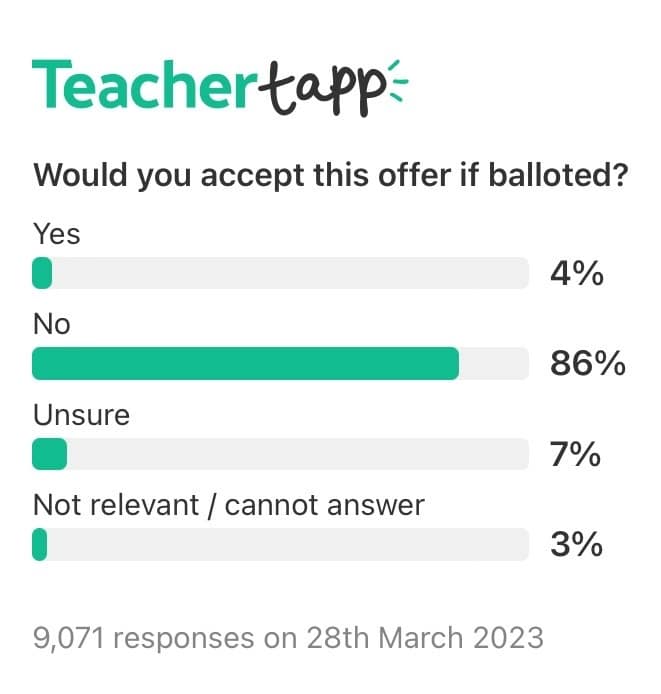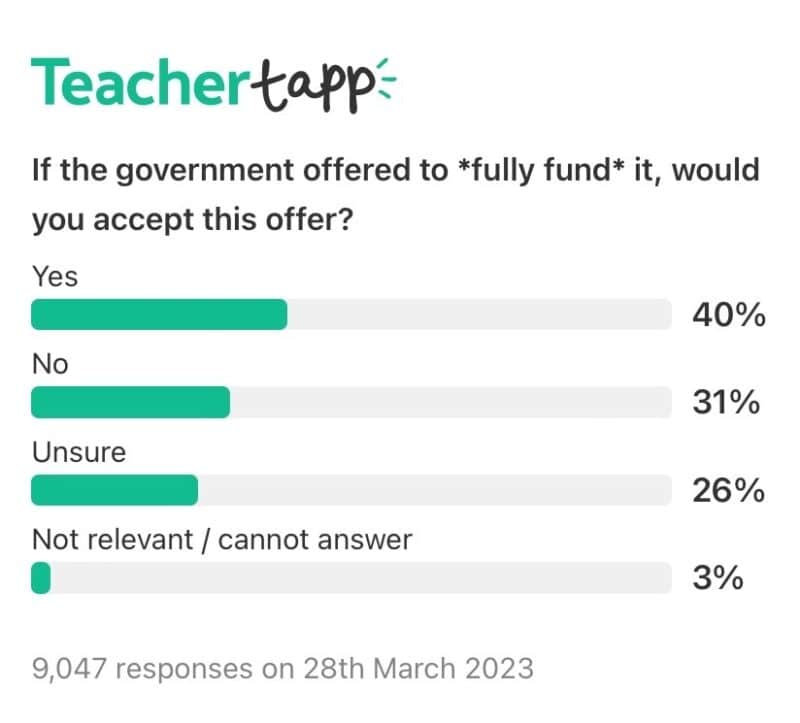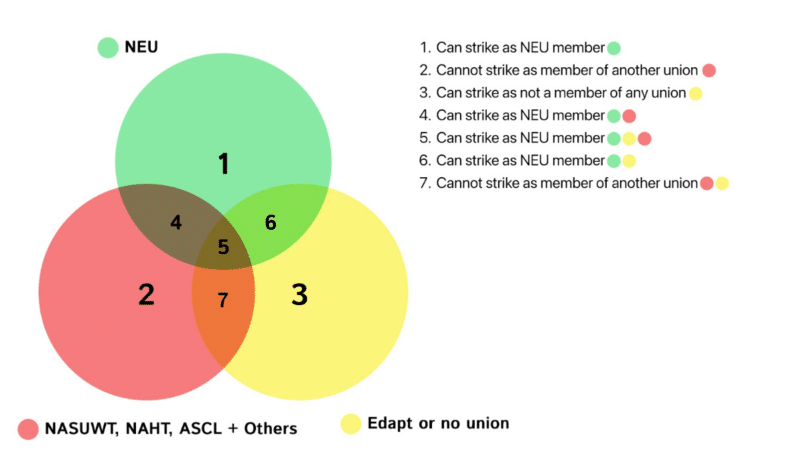Teacher Strikes 2023 (Easter Update) – What happens now? [Archive Reference Article]
Contents
[Archive Reference Article]
Introduction
A more recent update of some of the key issues addressed in this article and what to expect during the summer term has been published here.
This article aims to provide an update on the ongoing dispute between the education unions and governments of England and Wales. This objective guidance by Edapt is written with neutrality in mind with a goal to informing teachers so that they can understand how the situation might affect them and make informed decisions going forward. Edapt are an apolitical and independent organisation (not a trade union) that offer edu-legal support and professional casework services in individual employment disputes and allegations, similar to some of the services offered by a traditional trade union. Edapt recognises that industrial action, teacher strikes and the related issues are emotive topics but in line with its apolitical ethos, provides no judgement or commentary on these areas.
You can find more about Edapt by clicking here.
The Dispute So Far
In July 2022, the School Teachers’ Review Body (STRB) which makes an independent recommendation for teacher pay rewards in England recommended a pay increase for teachers in England for 2022-23 of 5% for all teachers and 3% for 2023-24. Some additional payments were recommended for those at the lower end of the pay scale. At the same time, the Independent Welsh Pay Review Body (IWPRB) which serves a similar purpose for Welsh teachers also recommended a pay increase of 5% for 2022-23 and a subsequent increase of 3.5% in 2023-24.
In the Autumn of 2022, education unions in both England and Wales announced plans to ballot their members for industrial action over the proposed pay offers arguing with the main areas of contention being that they were significantly below the rate of inflation, came off the back of a period of real terms cut in pay and also would have to be met from existing school budgets. The NEU, NASUWT and National Association of Headteachers (NAHT) held formal ballots specifically on taking industrial action. The Association of College and School Leaders (ASCL) held a consultative ballot. Under industrial relations law, unions are only allowed to ballot specifically on pay disputes but these ballots were also considered to represent further concerns within education around funding and conditions.
In January 2023, the National Education Union (NEU) announced that its ballot of members had reached the necessary threshold for industrial action amongst teachers in England and Wales and subsequently called for a series of 4 day strikes spread across February and March 2023. Despite votes being in favour of action, other unions’ votes did not meet the legal threshold of turnout and were unable to join the action although the NAHT did meet the threshold in Wales. Since the culmination of the final day of strikes on 16th March 2023, education unions have been in further talks with both the devolved government who oversee teachers’ pay and conditions in Wales, and also the Westminster government who oversee the same in England.
In Wales, an agreement was reached between the government and the NEU prior to the final days of the strikes in March. Details of this settlement can be found later in this article. An agreement is yet to be found with the NAHT in Wales where their members are continuing with action short of a strike.
In England, the NEU, NASUWT, ASCL and NAHT entered a period of intense negotiations whilst industrial action was paused. These negotiations not only surrounded the issue of pay but also wider conditions which included the role of Ofsted.
These discussions culminated in a formal offer being made to the unions on 24th March 2023 which were then shared with members on 27th March. Each union is now in the process of making a decision as to what to do next.
What are the pay offers?
In Wales, an agreement was made between the NEU and the Welsh Government. This is summarised below.

The increased pay offer will be fully funded by increased government spending.
In England, the situation is more complicated. On 24th March the Secretary of State for Education, Gillian Keegan, wrote to unions outlining the government’s offer. This offer came with certain conditions being met, namely that it would only “crystallise” if the union executive committees presented it to their members in either a neutral or positive manner. If this doesn’t happen, it is implied that the offer will be rescinded and any pay offers for 2022/23 will be voided and the offer for 2023/24 lay in the hands of the next STRB review. As some unions have asked their members to reject the offer (see below), it seems that this will be the case. For reference the pay elements of the offer states:

There are differing views on whether this offer is fully funded or not. The unions argue that it isn’t, whilst the government is saying that it is. What we can say objectively is that this pay offer will only be partially funded from previously unannounced government spending i.e. new money that was not on the table prior to the dispute.
The government has stated that the £1000 payment for 2022/23 will be funded from new spending although no additional funding will be allocated for the existing 5% pay offer.
For the 2023/24 pay offer, the government explains that the additional £2bn of education spending allocated in the Autumn Statement in November 2022 will be used for the majority of this award. It is worth noting that this funding increase was made prior to the balloting for industrial action by unions. The government has judged that decreasing energy prices and a pay settlement with support staff means that on average, schools will be able to afford 4% of the 4.5% additional pay award from money which will now not be spent as part of the £2bn allocation. The impact on individual schools could vary quite considerably due to a number of factors including the variability of contract terms that schools may have with their energy suppliers. For example, a school that was able to fix their energy costs at a low rate before the energy price rise will be in a better position than a school that now have fixed energy costs at a higher rate than the prices that energy costs are expected to fall to.
The remaining 0.5% of the award will come from additional government spending. The government is therefore arguing that the pay offer is fully funded but this is not a view that is accepted by the unions.
Additional offers were made in relation to a number of non-pay related factors unions discussed with the government:
- Removal of the statutory requirement for schools to use performance related pay.
- Allowing schools to offer automatic pay progression.
- Ofsted providing greater clarity on inspection windows and also reviewing the process by which schools can make complaints.
- Creating a workload task force with the aim of reducing teacher workload by 5 hours a week. The membership of this taskforce will be decided by unions and the DfE.
- Aligning the STRB process with the school budget cycle.
- Reviewing the complaints procedure for parents.
It is worth noting that the largest education union in Scotland the Education Institute of Scotland (EIS) also agreed a new pay deal in March with the Scottish government although the Scottish branch of the NASUWT is yet to agree to this.
The English education unions have made reference to this offer and subsequent pay scales highlighting the disparity in pay between the two countries. The initial offer made for Scottish teachers in May 2022 was for an increase of 2% from April 2022. The final offer agreed by the EIS was for a 7% increase backdated to April 2022, plus an additional 5% from April 2023 and a further 2% from January 2024. This pay settlement represents an overall pay increase for most Scottish teachers of 14.6% over the time period.
What are the unions saying? (Correct as of 8am 30th March)
Each union went into the negotiations with their own demands both on pay and on conditions. On 27th March, unions began to reveal the offer and also their responses to it. These are summarised below:
NEU – Putting the offer to members with a consultative online ballot which closes on 2nd April. They will announce the result of the ballot at their annual conference the following day. They are recommending that members reject the government’s offer on the basis that it is not fully funded, will increase the disparity between teachers in England and other home nations and also represents a real terms pay cut.
NASUWT – Putting the offer to members and are recommending that the offer is not accepted. In their words “The offer falls short of what the Union has demanded from the Government both for pay restoration and on non-pay improvements. Nevertheless, we believe that it is right to hear what our members think about the offer as it stands.” They are also asking their members whether they would be willing to take strike action or action short of a strike if the offer is rejected.
ASCL – Putting the offer to their members in a neutral capacity with their survey closing on 31st March. Details of the results to come in the new academic term. There are no further questions around industrial action as part of the survey.
NAHT – Putting offer to their members but have been quoted as saying that it is inadequate. “We will be asking members to confirm or correct our early analysis that this pay offer cannot be afforded from existing school budget” They will also be asking members to vote on whether they would support industrial action if the offer were to be rejected although this vote would only be indicative and would require a formal ratification. In a call to members on 29th March, Paul Whiteman (NAHT President) said “I need to be plain with you … it’s likely that we will be considering strike action to join our sister unions … you can’t deny it, the size of teachers’ demonstrations has brought the govt to the table.“
What might happen next?
As the unions are now putting the offer to all of their members, feedback will be arriving soon and individual unions acting accordingly. Given the previous comments made by the government about putting the offer to members in a neutral manner, it is not known whether the offer still exists given that 3 of the 4 unions have not followed this instruction. If we assume that the offer does still exist, there are number of outcomes.
If all unions accept the offer. The period of industrial action will end and arrangements will be made to meet the terms of the offer.
If unions reject the offer, the outcomes will vary due to the outcomes of previous industrial action votes. Given recent polling from Teacher Tapp (see below), it seems unlikely that the offer will be accepted by unions.


NEU members will be entitled to continue their industrial action. The NEU has announced that 2 further teacher strikes will take place on Thursday 27th April and Tuesday 2nd May if the offer is rejected.. Their legal mandate for industrial action including teacher strikes is valid until the end of the academic year in July so more strike dates could be possible including dates that may affect national exams. The NEU have said that they do not want this to happen but have not ruled it out at this stage.
Other unions will need to decide their next steps. As it stands they will not be able to join in any further industrial action and teacher strikes as they have not passed the legal thresholds in their formal ballots. They may choose to reballot their members with a view to meeting that threshold although this is likely to take a number of weeks to administer. The consultative ballots that NASUWT and NAHT are taking will give an indicator as to how those votes could go, although it remains to be seen whether they will be able to overcome the turnout threshold (50%) which prevented their previous attempts to take industrial action earlier in the year.
According to their offer letter, the government position is that their pay offer will be rescinded and the pay review decision passed to the STRB although this stance could yet change. However, speaking on Sky News on 29th March the Education Secretary gave no indication that the offer had been withdrawn, saying that it was a “fair and reasonable offer“.
What options do teachers in England have now?
Until any further ballots are held, the situation remains similar to what it was in January 2023. This means that NEU members and non-union members including Edapt subscribers will be eligible to take part in any forthcoming industrial action and teacher strikes. The Venn diagram below gives an indication of how this applies:

Detailed guidance on this situation can be found in the following support article.
Teacher strikes: where can I find more information?
Edapt subscribers are able to access advice and guidance from our professional caseworkers by getting in touch with us. We will try to support non-subscribers with queries where we can. Edapt’s advice is always given on an independent and apolitical basis, aiming to provide objective information so that teachers and education staff can make informed decisions. If you are a union member, you may wish to contact your union for further advice. If you are neither a member of a union or an Edapt subscriber, we would recommend joining one or the other to ensure that you always have access to some support.
We will continue to update our support articles as the situation changes to try and ensure that all teachers are kept up to date.
The information contained within this article is not a complete or final statement of the law.
While Edapt has sought to ensure that the information is accurate and up-to-date, it is not responsible and will not be held liable for any inaccuracies and their consequences, including any loss arising from relying on this information. This article may contain information sourced from public sector bodies and licensed under the Open Government Licence. If you are an Edapt subscriber with an employment-related issue, please contact us and we will be able to refer you to one of our caseworkers.
